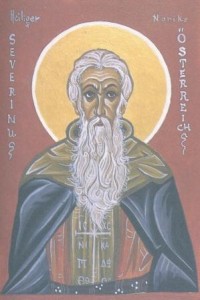Many disasters have occurred in the world in recent years, both natural ones: earthquakes, tornadoes, hurricanes, tsumanis; and man-made ones: wars, uprisings which displace families, shootings of innocent victims by mentally disturbed people. After each of these disasters, there is always a great outpouring of sympathy for the victims and many good people come forward to help in whatever way is needed. Fire fighters and rescue workers provide help in escaping danger, Red Cross and other agency workers provide food and shelter, nurses and doctors provide medical care, and ordinary people give money and time to help those in need. Those who help do so selflessly and often anonymously.
In Christianity’s two-thousand years of history, many of the saints of God have performed this kind of service in times of disaster when the need was great. St. Severinus of Austria was such a hero.
Almost nothing is known of Severinus in the first 40 years of his life. He is thought to have been born around 410, perhaps in Carthage in North Africa. There is evidence that he knew St. Augustine, Bishop of Hippo, and that he had knowledge of the ascetic practices of St. Anthony the Great, the father of monasticism.
The monk Severinus apparently appeared suddenly and anonymously in what is now Austria around the year 453. He settled as a hermit near the city of Vienna, giving no account of his background, but his name and manner indicated the status of an educated Roman aristocrat.
Severinus came with the intent of providing aid to those who had been devastated by the attacks of Attila and his army. That fierce leader of the Hun Empire had moved through Europe, plundering everything in his path. His soldiers were feared throughout the land because of their ruthless violence. When Attila died in 453 (the year that St. Severinus arrived in Austria), his leaderless army still proved to be a threat to peace. Those who had survived the attacks were left without food and shelter, demoralized and without hope for the future. They needed a hero and St. Severinus was God’s answer to that need.
As he helped to ransom captives and find food for those who were starving, the monk also preached about the love of Christ. His practice of fasting and spending much time in prayer was one which these people who had lost everything admired. His humility brought respect and admiration. Many people listened to his teaching and believed.
Among those who came to respect St. Severinus was the pagan Germanic chieftain, Odoacer. A large man, he came to visit the monk in his cell but balked at the very low entrance. When St. Severinus told him to stoop low, Odoacer complied and was able to enter and seek his counsel.
As he worked among the people along the Danube River, Severinus founded monasteries which attracted others who desired the ascetic life. As with many other saints, Severinus was torn between his desire for solitude and the great need he saw around him which required an active life among the people. Severinus obediently answered God’s call.
When the danger of violent attacks finally appeared to be over, St. Severinus was able to retire to his cell in peace. The monks around him heard him singing Psalm 150 as he lay dying (around the year 476): “Let everything that has breath, praise the Lord.”
Six years later, violence threatened again and the monks fled to Italy with his relics, which were eventually placed in a Benedictine Monastery near Naples, renamed the Abbey of San Severino in his honor.
May St. Severinus intercede for those who labor today as rescue workers and may we, like him, obey the call of God to do whatever we can to help in times of disaster. Holy Severinus, pray for us.
